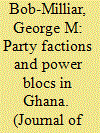| Srl | Item |
| 1 |
ID:
120909


|
|
|
|
|
| Publication |
2013.
|
| Summary/Abstract |
In 1999, the year before Ghana's 2000 election, the country experienced a large, unexpected decline in aid. The incumbent National Democratic Congress (NDC) lost the election. Did the decline in aid hurt the NDC at the polls, or was it simply incidental? Using data from a national, World Bank-funded electrification project, this article shows that the NDC was able to allocate aid according to explicitly political criteria. The article also exploits a quasi-experiment in aid disbursements to show that electrification caused NDC voting to increase in the constituencies that received electrification. Pre-electoral aid fluctuations exert a modest but measurable force on voting patterns. These findings add weight to calls for donors to coordinate to reduce aid volatility. They also show that incumbent governments can allocate aid strategically to secure votes, even under the best-case scenario of strict donor monitoring in an established democracy.
|
|
|
|
|
|
|
|
|
|
|
|
|
|
|
|
| 2 |
ID:
120908


|
|
|
|
|
| Publication |
2013.
|
| Summary/Abstract |
Competition for the executive leadership of a political party and the distribution of state patronage in Ghana is influenced by factional alignments and group interests. In December 2008 the National Democratic Congress (NDC) regained political power, and within months rifts appeared over the allocation of ministerial portfolios. The intra-party murmurings became public when two factions supported rival candidacies for the party's presidential nomination. The pro-Rawlings faction supported the candidacy of Nana Konadu Agyemang-Rawlings, and the anti-Rawlings bloc backed President John Evans Atta Mills. Drawing on Boucek's (2009) typology of factionalism, this article argues that factionalism within the NDC is a dynamic and complex process of informal groupings competing and jockeying for power to satisfy members' interests. It draws three conclusions: party factions are ad hoc groupings that are nurtured into a power bloc, and are constellated around particular individuals; factional conflicts are not rooted in ideology, but are based on differences in policy goals, interests and patronage; and, finally, factionalism fluctuates between cooperative and competitive phases.
|
|
|
|
|
|
|
|
|
|
|
|
|
|
|
|